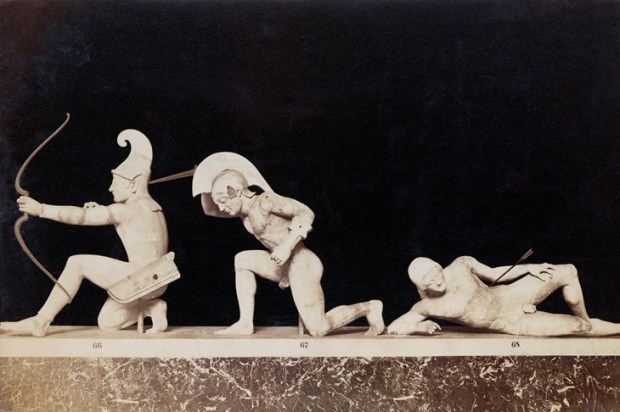In response to a decision by Jeff Bezos, the owner of the Washington Post, not to endorse a Presidential candidate, an editorial board member wrote in his resignation: ‘Until Friday, I assumed we would apply the same values and principles to an editorial endorsement of Vice President Kamala Harris.’
Whatever he intended by that statement, one would think an editor of a major US newspaper would understand that the meaninglessness of a reference to the Washington Post’s values as a reason for endorsing Harris.
Still, ‘values’ is a word used regularly by journalists of every persuasion which speak volumes about the education curricula. Politicians reflecting on the problem of political violence use the term pejoratively to describe a resort to political violence as, ‘not consistent with our nation’s values’, as if that is a condemnation.
Often we hear ‘values’ used to described a nation’s moral character: Australia’s values are different from American values while British values are different from French values. Few seem aware of just how vacuous, even irrational that usage is; but let me explain.
The failure of the Indigenous Voice to Parliament referendum was referred to recently to illustrate the different values of each side. All it actually said was that the person didn’t agree with the outcome.
Australia used to be described as the land of the ‘fair go’, a description with very few details. Nevertheless, a fair go required every Australian to be just in his dealings with other human beings. Yet, even without detail the fair meant pretty much the same to everyone; something like being friendly to strangers, even turning the other cheek; generally speaking, showing goodwill to others.
The fair go seemed to encapsulate pretty much everything in the second table of the Decalogue and a thing or two from the first. It definitely didn’t mean equality as understood by the Canberra socialists or the human rights factory in Melbourne in Sydney.
Before values was popularised in the 19th Century, people were described as ethical and even then, the authority on ethics was Aristotle, who comprehensively explained the different virtues and their active part in human nature in his Nicomachean Ethics. In the Ethics we find man defined as the rational animal as distinct from the reasonable animal. Given the number of academics, lawyers, politicians, and judges who supported the Indigenous Voice to Parliament, Aristotle obviously had a different meaning in mind.
Still, by describing man as rational, he implied and argued that the highest human activity was the exercise of reason or, as he also said, an activity of the soul. At this point we must distinguish deliberative choice from calculation, the basis of modern science; mathematics is a tool of reason but it cannot distinguish between right and wrong.
Aristotle argues that since all men desire to be happy, true happiness for man, other than the good feelings that come from an excess of pleasure, will only come when we perform actions that are the result of deliberative choices made by the rational soul.
In the Ethics, Aristotle explains that moral virtue relates to the pleasures and pains we feel when we choose certain actions. As our choices can be over or under-influenced by the pleasures and pains we experience, the virtues are the habits we acquire by resisting the allurements of certain pleasures, and to tolerate certain pains when we make those choices.
We acquire good habits by resisting pleasures and tolerating pains are the virtues. Since actions are concerned with feelings and the pleasure or pain relating to the feeling that follow every action, Aristotle explains that the virtues are the habits we acquire as we learn to control the effect on us of the pleasures and pains.
The Greek word for habit is εθος (ethos) and Aristotle says that we learn to be ethical by doing good actions and acquiring good habits in regard to the different pleasures and pains associated. There are two kinds of virtues: moral and intellectual. The moral virtues are associated with bodily pleasures and pains and he treats them in Ethics Books I – IV. The intellectual virtues are treated in the remaining chapters. Aristotle treats justice, however, as a separate virtue in Book V, with a short note on natural right; not to be confused with human rights.
Children learn good habits regarding virtue temperance by not eating sweets before dinner, not wasting their food, and doing what their parents tell them. By obeying their parents, children learn obedience to authority and the law and moderation in respect of the pleasures of food and drink. As one scholar explained, you become virtuous by repeatedly doing virtuous deeds. Over time, we learn the habits associated with the virtues of temperance, courage, and justice and are said to be virtuous.
Aristotle identifies a number of different virtues and vices, all of which have to do with choosing a middle way between an excess or deficiency of whatever pleasure or pain. If courage is between rashness and cowardice, temperance between self indulgence and insensibility, truthfulness between boastfulness and irony, and liberality between prodigality and meanness – then it won’t be difficult to work out what Aristotle would say what excesses and deficiencies relate to the virtues of magnificence, greatness of soul, gentleness, and friendliness for it is the excesses and deficiencies that the virtues help us to avoid.
Aristotle also argues that to be courageous or temperate or virtuous in any way, an action must be willingly chosen because it is right and not because some reward is expected.
Because actions involves choices, the virtuous choice on any particular occasion varies. The virtue in each choice may be the same, but the actual choice will be different. In other words, there is no table of ethical decisions that are learnt rote and applied. Each choice will involve unique deliberations about the particular end sort and hence the appropriate choice to secure that end.
Because ethics is a practical discipline, the most important intellectual virtue is prudence, the virtue of practical wisdom. Prudence is the supreme political virtue although it has has connotations of caution, of playing it safe that Aristotle did not intend. Aristotle’s arguments demonstrate that ethical choices can never be deductions from any rules, principles.
By understanding ethics in the manner explained by Aristotle, we learn that ethics is a personal obligation of acquiring and practicing the various habits. For the vast majority, the excesses are evident in relation to eating, drinking, sexual intercourse, and avoiding violence; telling the truth is only acceptable if you are sure of being caught. While each individual knows they should be temperate, most people are aware that the law provides a penalty for those who disobey.
Unlike today’s journalists, Aristotle says that the moral character of a nation or regime (its values?) requires that we understand a nation’s regime or system of government and the moral character of the men and women who govern. As the laws they pass will reflect their character, the citizens by obeying the laws adopt the rulers’ moral character.
In the rush to adopt ‘values’, it has been forgotten that they were assumptions made for the purpose of having a scientific explanation for human action that would permit future actions to be scientifically predicted. However, since science only deals with objective facts, moral principles were not factual and objectively provable. They were said to be subjective, arising in the subject. That people had principles was a fact. Whether they were good or bad was unknowable and subjective. They were called values; every student is taught in Social Science 101 that values are subjective.
If we revisit the issue from our Australian perspective, it is still possible that many Australians believe in God and his revelation. Those believers learned their ethics from the Bible: the Ten Commandments of the Old Testament or the condensed version from prophet Micah 6:8:
The Lord has shown thee, 0 man, what is good: and what doth the Lord require of thee, but to do justice, and love mercy, and to walk humbly with thy God?
God has shown what is good. Justice, mercy, and humility are good, according to the Lord and to be practised by every faithful man. This explanation should trigger anyone familiar with Portia’s famous speech about mercy in Shakespeare’s Merchant of Venice. That speech about the quality of mercy is her response. After telling Shylock: ‘Then must the Jew be merciful?’ To which Shylock responds: ‘On what compulsion must I? Tell me that.’
Mercy in the Old Testament is a gift to a man by God if he is faithful. Portia could have responded: ‘The Torah compels you.’ Instead Portia lectures Shylock on both the nature of mercy and the need for it; mercy though granted by God, is owed by man to man.
Portia even claims mercy is superior to justice. When the trial is concluded and Shylock has lost, however, Portia shows no mercy herself but imposes every element of the Venetian statute.
The most important point to remember is that man’s intellect understands the nature and purpose of the virtues and their intrinsic necessity for civilised society. By not understanding the true nature of ethics our ability to discern and describe the heinous choices that some have made.
It is for that reason that so many young men and women filled the streets demonstrating in support of Hamas. They were expressing their ‘values’: peace at any price or cowardice by another name. For their values they would sacrifice the hostages and Israel to a madness that obeys only its own law.
Thank God, Israel has an ethical government.
The three examples given above each result in different choices.
As values are only subjective feelings, the values of the murderer, the abortionist, or terrorist are of equal worth to those of the investment banker, the tree-hugging charity worker, and equal even to the children-loving, law-abiding father and mother.
The Ten Commandments, together with justice, mercy, and humility are good for each man and woman and a worthy way for each to act because they are ordered by God. We choose on the basis of reason which might be needed in the circumstances, but not to disobey.
Aristotle, on the other hand, explains that the different ethical principles are reasonable because they are based on human nature.
Dr David Long BA (hons econ/pol sc) PhD Law

























